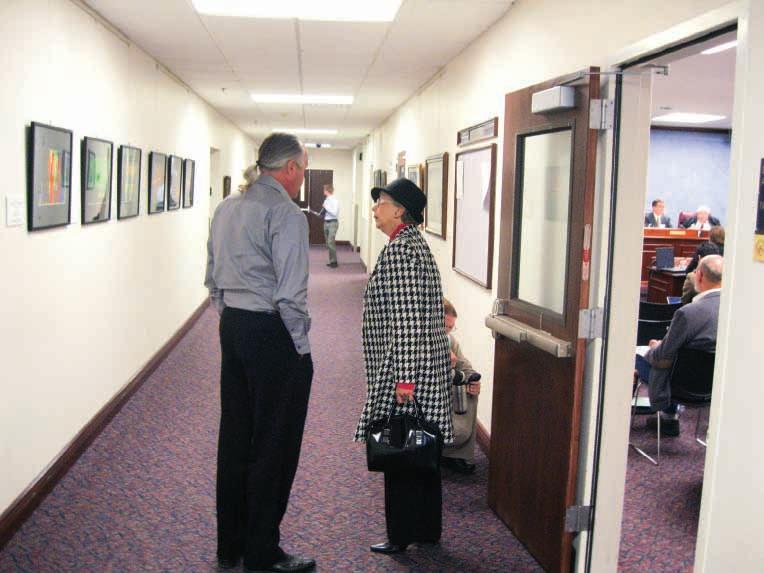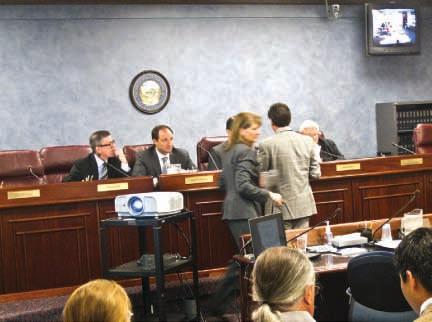
8 minute read
News
from May 9, 2013
ALEC in Nevada spotlight
For many years, the Nevada Legislature has paid $1,000 a year dues to the American Legislative Exchange Council (ALEC), just as it does to groups like the National Conference of State Legislatures and the Council of State Governments.
Advertisement
But in the case of ALEC, the lawmakers were actually making a contribution of taxpayer dollars to a right wing political group.
This week Progress Now, a Nevada political group, released a report on the Nevada Legislature’s involvement with ALEC, including detailed lists of money accepted by Nevada legislators, side-by-side comparisons of ALEC bill drafts with bills introduced by those Nevada legislators, and a historical look at how Nevada came to be a cat’s paw for ALEC.
ALEC is a political group created under section 501(3)(c) of the Internal Revenue code. Through it, right wing millionaires and corporations such as R.J. Reynolds, State Farm and Koch Industries indirectly influence state legislatures by cultivating certain legislators with briefings and education activities. This supposedly protects the organization from having to register under state lobbying registration laws and also keeps its hand hidden. Instead, it drafts model laws that its state legislator members take back to their states and pass laws friendly to ALEC’s corporate funders (“Corporate group gets scrutiny,” RN&R, July 28, 2011). Growing scrutiny of ALEC prompted by the higher public profile of the Koch brothers has led some corporate funders such as Bank of America, Bristol Meyers, Johnson & Johnson, Walmart and Wells Fargo to sever their ties with it.
The Progress Now report can be read online at www.progressnownevada.org/blog/2013/05/alec-report.html.
Bar provides forum for mining
Nevada Lawyer magazine, a publication of the State Bar of Nevada, has published an article titled “The Taxation of Mining.”
The piece was written by James Wadhams, a lobbyist who is currently working for the Newmont Gold Corporation against a measure to eliminate a cap on mining taxes. Wadhams’ article is sympathetic to his mining clients and states as fact assertions that are a subject of debate in the Nevada Legislature.
No competing article by critics of mining was included in the magazine. Editor John Zimmerman did not respond to an email seeking comment.
Pro and con
Reports from the Clean Energy Project and the Nevada Policy Research Institute reached conflicting conclusions in similar reports.
The NPRI is a conservative group which produced its own report. It called the state’s Renewable Energy Standard—which requires utilities to move steadily toward greater use of renewable sources for electric generation—a “scheme” that is “unlikley to deliver significant progress” in energy diversification but will drive rates higher and businesses out of state. The report was written by David Tuerck, Paul Bachman and Michael Head.
CEP commissioned its report from Applied Analysis, a Las Vegas business research firm also used by the Nevada Mining Association. Its report conceded higher rates—at least for a time—but also said the energy standard will lead to “higher rates of employment, wage and salary payments and economic output.” The report was written by Jeremy Aguero of Applied Analysis.
For decades, higher initial rates during transitions to renewables have been assumed, but energy analyst Arne Jungjohann has written, “The rates are ‘degressive,’ meaning they decline over time to drive down future prices.”
—Dennis Myers
Back to earth
Financial experts: No early economic comeback in Nevada
The notion that Nevada’s economy is in recovery received a setback when by the Nevada Economic Forum urged Dennis Myers caution in budget-building. The Forum, whose predictions of state government income are binding on the state budget, said there will be only a small amount of additional state revenue over the amount already expected in the next two years—about $44 million, or less than a percentage point of the Forum’s November numbers.
Carole Vilardo nevada taxpayers Association
The news turned attention to Senate Joint Resolution 15 of the 2011 Nevada Legislature, which—if approved again this year and then by voters next year—would remove a tax loophole for the mining industry in the state constitution.
But otherwise, some observers said the underwhelming news was healthy for the state, because it brings some boosters who had been touting economic recovery back to earth. What recovery exists is clearly not robust.
“To suggest that we’re prosperous or that we’ve recovered, whatever, this says otherwise,” said Guy Rocha, a historian who has compared the current recession to the downturn that followed the decline of the Comstock Lode and is critical of policymakers for not doing enough to rebuild the state’s economy (“What will replace the casinos?” RN&R, July 29, 2010). Job creation has not been the priority in the 2013 Nevada Legislature that it was in the 2011 session.
“Are we recovering as fast as we’d like to? No,” said fiscal expert Carole Vilardo of the Nevada Taxpayers Association. “Are we starting to recover? Yes, I think we are. But I think it will be slower than we would like.”
Vilardo said expectations that the casino industry will come back to as substantial a place in the state economy as it had before the recession were mistaken. “The greatest part of the industry’s revenue is now coming more from non-gaming activities—shops, wrestling, and so on.”
Sen. James Settlemeyer of Douglas County told the Reno Gazette-Journal, “It shows we are not recovered.”
The Forum’s message could also sober journalists, who have been criticized for upbeat coverage of a downbeat economy, thus reducing any sense of urgency about Nevada’s situation (“Rose colored reporting,” RN&R, Nov. 24, 2011).
The members of the Forum calculated their anxiously awaited prediction after spending six hours listening to economists, business analysts, and experts on government finance. The meeting was held in a packed legislative committee room, with a second room set up so that overflow audience members could watch the session on television. Influential banking and gambling lobbyist John Sande did not attend but said he received regular texts messages from inside the room, a method used by a number of lobbyists.
Outside the meeting of the Nevada Economic Forum, Nevada Taxpayers Association lobbyist Carole Vilardo was interviewed by Nevada Appeal reporter Geoff Dornan.
Services over goods
The Economic Forum was created in 1993, in part because of legislative suspicions that governors manipulated revenue predictions (known in bureaucratese as projections) in order to get programs approved.
Guy Rocha historian
Governments must calculate their budgets based on predictions of what their income will be, which can be tricky. It is particularly difficult in Nevada. The unpredictable and highly unstable sales tax is a big part of the tax system. And the lawmakers must plan based on predictions two years in advance because they meet only every other year. (All but four states meet annually and pass one-year budgets, according to the National Conference of State Legislatures.) A lot can change in an economy and a budget in two years.
When Nevada first adopted a sales tax in the early 1950s to deal with an emergency-type situation in education as the baby boom hit the state’s schools, it was a sweeping tax that applied only to durable goods. But over the years it has been lifted on some items such as food, medical items, and commercial airline-related expenditures. During the same years, consumer spending slowly shifted from goods to services, which are not sales taxable. As a result, the sales tax needed to be raised to keep producing the same
amount of money. Lobbyists have successfully defeated efforts to extend the sales tax to services. A new effort to tax services is underway at the legislature this year. A sales tax on services is generally regarded as fairer than a sales tax on goods. Republicans have been more supportive of it than some Democrats.
Vilardo marvels at the speed of change in taxation. It wasn’t that long ago, she said, that she was working on the Main Street Fairness Act at the federal level: “It would have allowed us to capture taxes from sales from the phone and catalog sales,” she said. Today, the urgency has shifted to online sales.
“People are no longer buying the tangible items but downloading them,” she said, meaning they pay no sales tax on items that were sales taxable when sold in stores, and Nevada thus loses money it once would have received.
On the issue of lifting the constitutional cap on mining taxation, the Legislature does have the option of scheduling a special election on the matter this year, as was done to remove the sales tax on food in 1979 and to provide for different mining tax rates in 1989. With the highly publicized practice of Nevada shipping mental patients out of state on buses presumably halted and patients jamming mental
health facilities as a result of firings in the wake of the scandal, some lawmakers say it may not be possible to avoid a special session later this year to deal with the problem. Any solution, they said, will be expensive, and money is hard to come by after the Economic Forum report. Ω

P HOTO/DENNIS M YERS
During a break in its proceedings, members of the Nevada Economic Forum confer with staffers.
Ramp closed
The eastbound on-ramp to Interstate 80 at Center Street was closed for more than an hour Monday as rescue workers tried to extract the driver of this car. Police said the car was traveling south on Center and turned onto the ramp against the red light, crossing the path of an oncoming car that had a green light. After the driver was removed from the vehicle, he was taken to Renown Hospital. The body of a dog killed in the wreck was also removed.

Forget the ‘deal of the day’! Visit www.newsreview.com
















